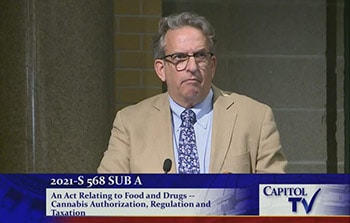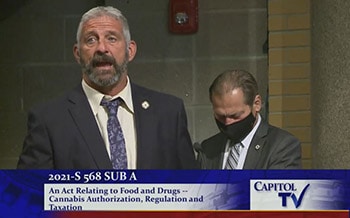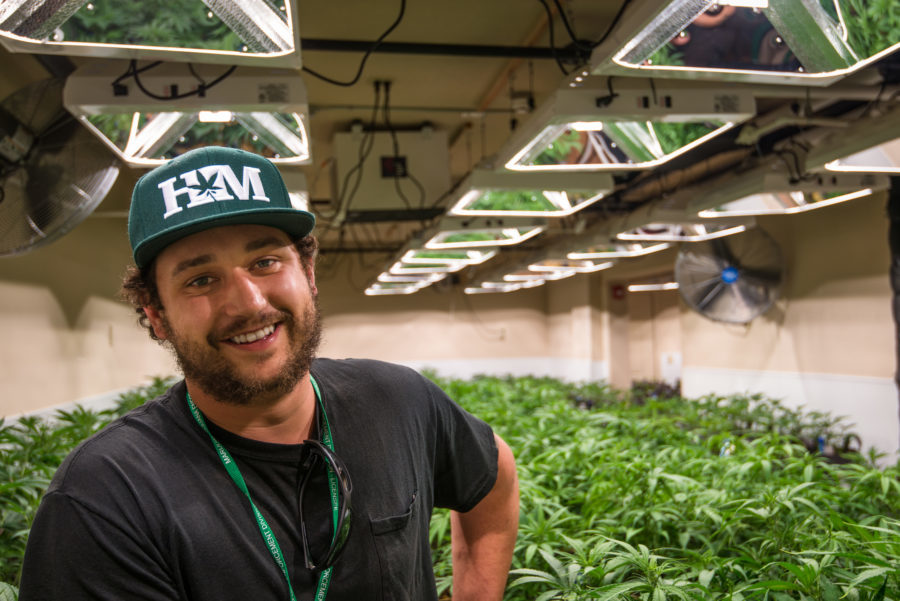While Pride month parades, community festivals and other celebrations have been underway all month long, many more events are set for this weekend before June winds down.
Dispensaries across the country have been commemorating the month to honor and recognize the LGBTQ+ community with special events and promotions, but there are other ways the cannabis industry promotes inclusion behind the scenes all year long. However, there is also still more work to do.
In this special guest interview, Cannabis Business Times and Cannabis Dispensary asked three cannabis industry leaders from the LGBTQ+ community to share insights on how the industry can better support LGBTQ+ employees and customers, improve equity and elevate diverse perspectives and ideas. Excerpts from the conversation with Ian Hackett, chief marketing officer and head of compliance for Napa Valley Fumé, Clifton Lambert, director of human resources with Jushi Holdings Inc., and Niki Mohrlant, senior director of operations for Jushi’s Beyond/Hello dispensaries, are below.
Q: What has your experience been working in the cannabis industry?
Clifton Lambert, director of human resources, Jushi: “It’s been overall positive. When you come into cannabis, you have to have a very different mindset. The people in this industry are really passionate about what we’re doing and understand how important cannabis is to the LGBTQ+ community. Being a part of the LGBT+ community myself, you do feel that you’re not always recognized the way you want to be. But cannabis just kind of opens up that door because of the connection between cannabis and that community. I’ve been able to be more myself with Jushi than many other places. People embrace it. And I think that we set the tone from the get-go to let people know that we welcome all kinds and encourage you to be yourself. We want you to feel comfortable here.”
Niki Mohrlant, senior director of operations, Jushi: “To Clifton’s point, I would say it is super accepting. But also I think at this point in my own career, there’s this point of getting in positions where you can be the voice in the room and elevate others. And I think that because cannabis has just such a wide range of different people from all different sorts of backgrounds, for me, it’s just been this unique place to say, ‘Hey, you know, if we’re designing a dispensary, have we thought about genderless bathrooms?’ I don’t need to be the gay person in the room. I need to be the person who’s thinking without making assumptions. I’ve always been welcome to be that person who says, ‘Hey, it, it may not be broken, but we need to fix it.’ And we need to think about who is receiving this, what that journey is, whether it’s our customers or team members or our partners within the organization, what are the optics? How do we make decisions? How do we make considerations for every group and everybody all the time? And sometimes it’s hard. But the one thing that I try to encourage not only my peer group, but anybody around me is like, if you have something to say, you should say it. Then when people have ideas, saving space for them to be heard. And the cannabis industry is ripe for that.”
Ian Hackett, chief marketing officer and head of compliance, Napa Valley Fumé: “My first experience in the cannabis industry was meeting the team at Napa Valley Fumé, and they made me feel very welcome out of the gate. I was rather nervous going out to our farm for the first time, meeting the farm team was intimidating to me for some reason. Perhaps because it was in a very remote place [well outside of the city] and I didn’t have anyone to brief me on what to expect. When I finally got there, the general manager welcomed me with literally open arms and she said, ‘Please get in here, and I need your help.’ To Niki’s point of being that voice in the room that is heard and is respected, it’s not just the LGBTQIA+ voice, it’s the voice that brings a different perspective to the table. And I think that from an LGBTQIA+ community is important to have a voice at the table. I know that having my voice at our table has really helped us as a company move forward from what we plant to how we bring our products to customers.
“However, I did have slightly different experiences going to trade shows. It wasn’t necessarily that I felt like an outsider, but I didn’t see any LGBTQIA+ representation at the trade shows I’ve been to so far. That is something that needs to change. I don’t let not seeing representation stop me. I think it’s where I am in my career. I am able to walk in, see the table, and take a seat. Now, I want to make room for others at the table to make sure we are building from a point of inclusion.”
Lambert: “We’ve been able to climb the ladder, and now we’re in a spot where we have the ability to raise our voices on important LGBTQ+ issues that affect the masses, and people feel that change. It’s been a rough road getting here, where the real work for change starts.”
Q: What do some of those changes look like on the ground, and what are you and your companies doing to support LGBTQ+ employees?
Lambert: “One change that’s been most recognized is we added gender pronouns early on into our new hire orientations. Employees get to learn about those pronouns, and we explain to every employee what to do if you mess up and why we embrace this. We provide pronoun stickers for employees and customers so they can display their preferred pronouns. I’ve never seen that in any company ever before, where someone actually took the time to think about it and say, ‘Hey, we’re going to support this because this is something that really affects people, although others may not understand.’ We are here to help people understand in the best way we can and educate them on why we support it.
“We are really are serious about it because we want to make sure that everybody is equally represented and everybody is comfortable.”
Mohrlant: “Being the voice for room and thinking about the optics around where we choose locations, it’s the same thing. These conversations are not always popular. When you’re trying to close a real estate deal, and you’re like, ‘Yeah, but they don’t like gay people in this neighborhood.’ It may not be a popular comment, but it is a comment that should be had. I would go to HR and say, ‘Hey, just so you know, I’m super uncomfortable. They have a lot of discrimination issues in this community and this state, and I’m letting you know that technically, I don’t think I can be gay in the state, and they could fire me for working here. So I just want you to know that I’m aware, and I need you to be aware.’ We pick places all the time and we don’t always have all the best information to make those decisions.
“We started talking about badging, too. If you have a different pronoun or you change your name from what’s on your birth certificate or ID, what’s that process like? That’s always been a thing, if the state doesn’t allow for this, how do we put someone’s name on their name tag or on their badge that’s in line with the state government so that we’re not at risk. So there’s a lot of those little things that come up for people that we have to pay attention to all the time and keep pushing the states or keep pushing the community or keep pushing the jurisdiction to create a better experience for everybody regardless of how they identify.”
Q: How do you communicate the importance of inclusion and diversity to your teams and ensure that everyone is working toward creating a positive culture and environment?
Hackett: “I think by making sure your HR team and the area leads are adequately trained on inclusivity and to make sure that they are aware of and understand the evolving, proper ways to engage with people is really important to create a positive environment for people to be themselves. Probably the most important as it relates to a positive culture. In the past, it’s where I’ve seen a lot of the most egregious violations is [in HR].”
Mohrlant: “How do you evolve the HR community to pay attention to this? Who are those people? And that’s a really good point because a lot of it starts even from a hiring recruiting standpoint. If you don’t have the voice in the room or the people in the seats, everyone’s scope is just a little bit more narrow.”
Lambert: “That’s our challenge every day in HR. I really am evaluating that over and over. That’s one thing that we’ve learned in this industry too, is that things change at such a rapid pace. And, of course, generations do the same thing. And making sure that when we’re interviewing folks for these roles, we make sure that diversity is always at the top of mind. Diversity just helps our company be better because you’re getting different thought processes from different people from different backgrounds. Your HR team has to be the champions. We have a lot of control in that process and must lead by example for the rest of the company. We’ve been super intentional in that area.”
Q: What can the industry do to better support the LBGTQ+ community, initiatives and take a lead in this space? What work needs to be done?
Hackett: “As an industry, be thoughtful about the products and experiences we are creating, how they are messaged and how they are marketed. In the cannabis industry, we have a unique opportunity to not only be honest, but we can do that while being creative. There were so many times in other industries like alcohol and tobacco, where they targeted—usually minorities—with a very false narrative that was really damaging to people. We have an opportunity to take those learnings are and take it in a much different direction.
“As Clifton just mentioned, I think companies and hiring managers really need to actively seek diversity in their candidate pool. It is very comfortable and common for people to just hire people they know. But that usually limits diversity. I think it’s about bringing the best talent to the role. I hear people say, well, I want them to have five years or 10 years or whatever years in the cannabis industry. I’d rather hear them say, this role needs to be able to manage a budget, or manage a grow. Or I need them to be able to keep our cultivation or our distribution practice in regulatory compliance. It’s very shortsighted from a diversity perspective, if we say you have to have 10 years of cannabis experience. The legacy market was very close-knit and we need to see more women, BIPOC, and LGBTQIA+ people enter the industry.”
Lambert: “I agree. Folks tend to hire people who look like them or who have similar beliefs or thought processes. It’s not something people do intentionally, but more attention should be focused on that area from the top. If you look at your business, and the diversity is limited, folks like us have to speak up. That’s what I love about this industry, I think we already have that platform established for us where we feel comfortable to speak up to say we need more diversity.”
Mohrlant: “The past year and a half has been so many things for so many people. My partner is in HR, as well, and one of the things that comes up is how to have these conversations. Did we say the right term? is it LGBTQ+? Is it people of color, or is it African American? I think everyone is so fearful to say the wrong thing. When can you have a safe space to have conversations to do it right? It should just be this authentic place.”
Hackett: “Sometimes you need to listen to the messages and not the words, and you can take those words and help the person understand why there is a better option for some of the words that have been chosen. As [cannabis] goes ‘mainstream,’ we must do so with inclusion and diversity as a foundational component instead of an afterthought.”
Editor’s Note: This interview has been edited for length and clarity.






